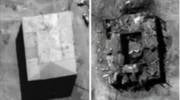
This Week in Israel’s History: IDF Launches Operation Orchard
A secret Mossad raid on the home of the head of Syria’s Atomic Energy Commission in Vienna revealed information about a nuclear reactor in Syria.

A secret Mossad raid on the home of the head of Syria’s Atomic Energy Commission in Vienna revealed information about a nuclear reactor in Syria.

July 24, 1922, marks the 94th anniversary of the affirmation of Jewish self-determination by the League of Nations.

On July 20, 1949, the Syrian-Israeli Armistice was signed. Syria was the last of the Arab countries that had attacked the newly established State of Israel to sign an armistice agreement.

It took Israeli commandos minutes to conduct one of the greatest and most daring rescue missions in modern history in Entebbe, Uganda, on July 4, 1976, after an Air France flight was hijacked by terrorists and a group of Jewish passengers was taken hostage.

On June 21, 1936, approximately 60 armed Arabs in British Mandate Palestine attacked a convoy of Jewish-owned buses traveling from Haifa to Tel Aviv. The modern State of Israel had not yet come into existence, so what were the Arabs fighting against?

The Farhud in Baghdad, Iraq was a pogrom, or "violent dispossession" carried out against the Jewish community on the Jewish holiday of Shavuot, June 1 and 2, 1941.
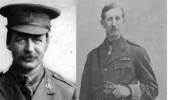
On May 16, 1916, Britain and France divided the former Ottoman Empire territory in the Middle East , including the Land of Israel, which came under British rule.
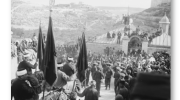
On April 4, 1920, before the establishment of the State of Israel and before any so-called "occupation," a Muslim festival attended by tens of thousands of Arabs erupted into violence against Jews in Jerusalem.
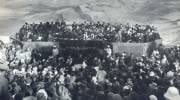
On April 1, 1925, the Hebrew University of Jerusalem, Israel's highest-ranking university and among the world's finest, officially opened.

On March 22, 1945, the Arab League Constitution was signed in Cairo in a ceremony marked by speeches from each of the six states represented.
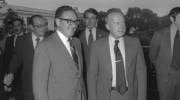
On March 18, 1975, the US undertook a “reassessment” of its relationship with Israel, creating enormous tension between the executive branch and the Israeli government.
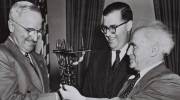
On March 6, 1948, Truman Adviser Clark Clifford Opposed the State Department on Partition, calling to divide Palestine into a Jewish and an Arab state.
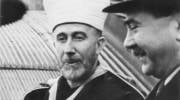
On March 3, 1939, the powerful Mufti of Jerusalem rejected the creation of a majority Palestinian-Arab state in the Land of Israel, staunchly opposing any Jewish presence whatsoever.

On February 22, 1948, Palestinian Arab terrorists, with the help of British deserters, bombed Ben Yehuda Street in Jerusalem. It was the first of many that would occur over the years in that location.

On February 19, 1936, Zionist leaders discussed how to confront proposed British restrictions on Jewish land purchases in the Land of Israel.

On February 13, 1931, the Passfield White Paper, which threatened the development of a Jewish national homeland in Palestine, was rejected by the British cabinet.
On February 3, 1919, a delegation of the Zionist Organization presented the case for a Jewish homeland in Palestine to the Paris Peace Conference.

On January 26, 1919, British Zionist leader Chaim Weizmann, who later became the first president of the State of Israel, warned that unless world Jewry secures a place of their own, they will be faced by a terrible catastrophe.

On January 23, 1950, the Israeli Parliament declared Jerusalem – the eternal capital of the Jewish People – to be the capital of the modern Jewish state.

Holding on to the strategic Golan Heights was even more imperative than Israelis had realized at the time, considering the Syrian civil war and the regional instability.
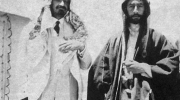
On January 3, 1919, Emir Faisal, son of Sharif Husayn of Mecca, and Zionist leader Chaim Weizmann signed the Faisal-Weizmann Agreement, an accord of mutual respect and cooperation.

On January 1, 1837, the city of Safed in the Upper Galilee suffered a devastating earthquake that killed thousands of people and caused almost total destruction.

On Dec. 24, 1969, Israeli commandos smuggled five missile boats out of Cherbourg. Israel had paid for the boats, which weren't delivered due to a French arms embargo.

The Israeli Parliament voted to annex the Golan Heights on December 14, 1981 - 14 years after capturing the territory in the Six Day War.

On December 11, 1947, Arthur Creech Jones, British Secretary of State for the Colonies, announced at the House of Commons that the Mandate in Palestine would end on May 15, 1948.

Exactly 68 years ago, the UN approved the partition of the Land of Israel, then Mandatory Palestine under British rule, into two states - one Jewish and one Arab.
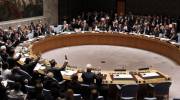
Shortly after Israel's stunning Six Day War victory, UN Resolution 242 was unanimously adopted as the basis for a Middle East peace treaty based on land for peace.
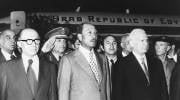
President Anwar Sadat of Egypt was the first Arab leader to visit the State of Israel. His brave initiative eventually led to the peace treaty signed between the two countries.

On November 10, 1975, the United Nations passed Resolution 3379, which defines Zionism as a form of racism and racial discrimination.

On Nov. 2, 1917, Lord Arthur James Balfour sent a letter to Lord Rothschild, affirming British support for the establishment of a Jewish state in the Land of Israel.
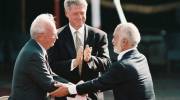
On October 26, 1994, Israeli Prime Minister Yitzhak Rabin and King Hussein of Jordan signed a peace treaty at the Wadi Arava Border Crossing.
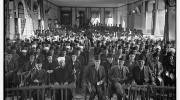
Arab leaders reject the Peel Commission Report of 1937, which proposed partitioning British-Mandate Palestine into separate Jewish and Arab states.

On Sept. 28, 1995, the Israeli-Palestinian Interim Agreement was signed by Prime Minister Yitzhak Rabin and PLO leader Yasser Arafat at a White House ceremony.

According to several historical sources, the ancient Jewish community in Yemen preceded the destruction of the First Holy Temple in Jerusalem in the year 586 BCE.
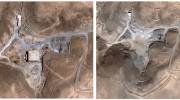
At a meeting in Washington that year, Olmert told Bush that if the US did not destroy the reactor, Israel would, even if it lacked support from the Americans.

Palestinian terrorists kill 11 Olympic athletes and the Arab League rejects Israeli peace initiatives, vowing to continue fighting the Jewish state.
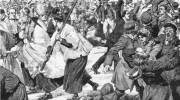
The Internet has helped to spread its anti-Jewish doctrine, apparently contributing to the global rise of anti-Semitism and hostility towards the State of Israel.

This week in Israel's history, a Jewish restaurant in Paris is attacked and the evacuation from Gaza begins.
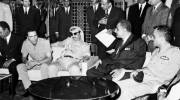
This week in Israeli history, Israel, Jordan and Egypt sign a ceasefire agreement, ending the 1967-1970 War of Attrition.
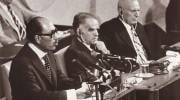
Zionist leader Chaim Weizmann sends a letter to British Secretary Malcolm MacDonald, citing disappointment with Britain's pro-Arab position, and Egyptian President Anwar Sadat invites Israel's foreign minister to a meeting in Austria.
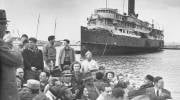
On July 5, 1950, the Knesset passed the Law of Return, allowing for the right of Jews anywhere to move to Israel.

One week after the hijacking of a flight from Israel to Paris on June 27, 1976, Israel mounted a daring hostage rescue operation - and succeeded in what has become the world's most famous rescue to date.

This week in Israel's history, Foreign Minister Moshe Sharett Reports to the Knesset on the Status of Israel’s Frontiers and President Lyndon Johnson Outlines Five Principles for Peace in the Middle East
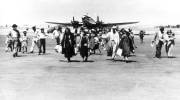
This week in Israel's history, Operation Ezra and Nehemia, the evacuation of Iraq's Jews, began, and 76 US senators urged President Ford to stand with Israel.

JFK offered Israel assistance against Arab aggression and Israel and the US signed an agreement for Israeli participation in Strategic Defense Initiative research.

This week in Israel's history, Napoleon issued a proclamation which recognizes the Jews as the rightful heirs to the land; the US sympathizes with Israel's fear of an independent Palestinian state.

This week in Israel's History: Arab rebellion breaks out in British Mandatory Palestine and Yitzhak Rabin leads a relief convoy into Jerusalem.

This Week in History presents Churchill voices support for Zionists; Israel and Jordan Sign Armistice Agreement.
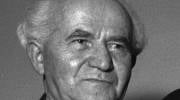
David Ben-Gurion tells the US State Department he will declare, against their wishes, independence for the Jewish State of Israel!

This Week in Israel's History: Iraq kicks out its Jews
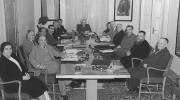
March 8, 1949 - Following the modern state of Israel’s first ever elections on January 25th, David Ben Gurion formed the nascent state’s first government.

This Week in Israel's History: Golda Meir Elected First Female Prime Minister of Israel

This week in Israel's History presents the day when Israel's Knesset Convened for the first time.